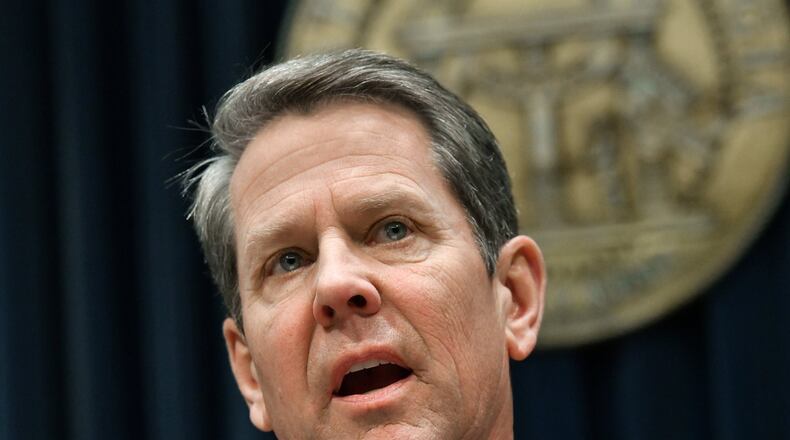Gov. Brian Kemp has publicly given his blessing to mayors and county officials to go beyond the restrictions he’s instituted to curb the spread of coronavirus.
Several of his top advisers, however, warn that some local governments have gone too far with measures to combat the disease.
Tim Fleming, the governor’s chief of staff, wrote Saturday on Facebook that “doomsday” models of the disease’s path has led to “people panicking and local governments across our state overreacting.”
“Ultimately, judgment is often clouded by power,” he added. “As a result of their overreach, many small businesses will struggle and some will not reopen.”
And Jeremy Brand, a Kemp consultant who has no official role in the administration, said broadly that Georgians should recognize how quickly public officials exert authority “sometimes based on nothing more than hysteria.”
>>More: Why Kemp balks at taking more drastic steps to combat virus
>>More: ‘Explosive spread’ of coronavirus in Georgia likely to worsen
The remarks triggered confusion and dismay among some local officials who brought up the governor’s frequent comments giving mayors and county commissioners leeway to embrace steeper restrictions.
“Is it too much to ask for some consistency within and out of the governor’s office?” said Andy Bauman, a Sandy Springs councilman. “C’mon ladies and gentlemen, let’s all get on the same page.”
Other local officials have applauded Kemp’s stance. Walton County Commission chair Kevin Little said Sunday he believes tighter restrictions aren’t yet needed in his northeast Georgia community, though he said that could quickly change.
“I’m not really big on government control and government telling you what to do,” he said, adding: “We just really don’t want to draw Walton County to a complete halt economically.”
It’s not clear what local measures drew Fleming’s criticism, and he didn’t elaborate. Candice Broce, the governor’s spokeswoman, said Fleming has fielded calls from mayors and county commissioners about how “confusing these local orders have become.”
Credit: Bob Andres
Credit: Bob Andres
She said several calls stemmed from "some problems" with advice from Dr. Carlos del Rio, an Emory University epidemiologist whose presentation to the Georgia Municipal Association last week urged cities to declare public health emergencies.
“We want any medical provider, public health official or emergency management official who encourages leaders to take specific action to do so with the most up-to-date facts,” she said. “We have concerns that didn’t happen here.”
In a statement late Sunday, del Rio said he’s confident in his data.
“I can only provide my best thinking based on my over 30 years working in this field, it is up to the people that are making decisions to decide how best to leverage its use,” said del Rio.
‘Overreact’
The comments punctuate a week in which the governor has ordered new measures to combat the coronavirus but stopped short of more severe restrictions to fight a disease that's sickened more than 2,600 Georgians and killed dozens more.
In the last six days, the governor has ordered that schools remained close through late April, banned many gatherings, shut down bars and nightclubs, authorized health officials to shutter businesses that don't enforce social distancing and urged "medically fragile" and certain others to stay home.
Map: Coronavirus cases in Georgia
Dashboard: COVID-19 stats in Georgia
But he's balked at more drastic steps, such as a statewide shelter-in-place mandate or an order halting dine-in service at all Georgia restaurants. Instead, he's said that local governments can impose steeper restrictions – and many have.
The GMA pressed hundreds of mayors to declare a public health emergency and take far-reaching steps to restrict mobility. And a growing number of cities and counties, large and small, have imposed restrictions that go well beyond Kemp's orders.
That's left a patchwork of rules across the state, with some cities and counties under voluntary curfews and others next door with more limited regulations.
It’s also led to mounting pushback from health experts and politicians who say the uneven approach could risk lives and further strain Georgia’s hospital system.
House Speaker David Ralston, a Republican, and Atlanta Mayor Keisha Lance Bottoms, a Democrat, are among the influential state leaders who have publicly urged Kemp to take more severe action.
"If we overreact," Ralston said last week, "thank God we overreact."
‘Stringent action’
At a statewide address on Thursday, Kemp cast his orders as a way to protect vulnerable Georgians while trying to avoid deeper economic fallout.
“I’m having to govern the whole state,” he said, adding that more than 50 counties still hadn’t had a confirmed case of the disease.
“If we can get our citizens to follow these directions, it will absolutely turn this curve and we will get on the other side of this virus.”
Credit: John Amis
Credit: John Amis
Broce, the governor’s spokeswoman, said the administration will continue to support local governments if they decide to pursue more “stringent action” despite Fleming’s remarks.
“They know their communities. We continue to offer and deploy resources. Ask Dougherty County and Albany officials. Ventilators, bed space, staff, supplies – we’re getting more and sharing with those in need,” she said.
Fleming, a former Newton County commissioner and longtime Kemp confidante, also raised a separate concern in his Facebook post that could become a growing challenge as local officials issue shelter-in-place orders.
“Local governments have now begun to cherry pick what businesses will remain open,” he wrote. “The state of Georgia is making decisions based on real time data, a team of trusted medical experts and a common sense approach.”
About the Author
The Latest
Featured







